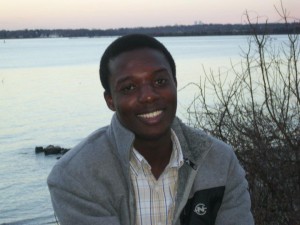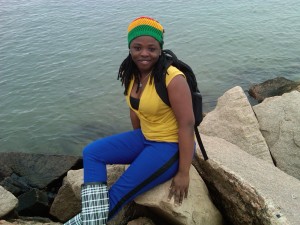Justice Camillus Mensah, top, and Adiza Ama Owusu
The Coastal Resources Center (CRC) at the Graduate School of Oceanography has put Ghana firmly on the map for many at URI with the center’s ongoing fisheries and integrated coastal management project Hɛn Mpoano (Our Coast) in the fast-growing West African nation.
In turn, the CRC has put Rhode Island firmly on the map for new graduates Justice Camillus Mensah, 28, and Adiza Ama Owusu, 26. The friends, who graduated Sunday with MS degrees from the College of the Environment and Life Sciences (CELS), had been teaching assistants at the University of Cape Coast in Ghana when they learned the CRC was sponsoring two students to attend graduate school at URI.
The two applied, were accepted and arrived at Kingston for the Fall 2011 semester. Justice concentrated on GIS mapping and spatial analysis. Adiza studied wetlands, watersheds and ecosystems.
Justice already was working with CRC on mapping in coastal districts in Ghana when he was accepted at URI. Dr. Don Robadue, manager of Hɛn Mpoano, said that both have assignments waiting for them when they arrive home this week.
For both, studying at URI has been a life-changing experience that they know will pay dividends for years. “In terms of academics, I think the style of teaching is much better than how we were being taught in Ghana,” Justice said. “Here, we were involved in hands-on projects. It’s very intense.”
Beneficial to both students while at URI were the opportunities to attend professional conferences, the close working relationships with professors, the roll-up-your-sleeves approach to learning that the school emphasizes and their internships – Justice interned at the EPA office next door to the CRC Bay Campus office, and Adiza worked with CRC’s U.S. team.
Adiza, who assisted CRC coastal manager Pam Rubinoff on wetlands migration, said that experience “exposed me to know what goes on in the real world, how to communicate and have successful relationships. In Ghana you don’t get real-life experiences; it’s more classes.”
Support from URI faculty and CRC staff was vital, they agreed. “They are always looking for opportunities for you to gain expertise to benefit you in your career,” Justice said.
Those careers will launch without a pause for jet lag when the two arrive home to apply what they’ve learned to their resource-rich and resource-vulnerable country. Neither expects to have time for a graduation party. But that is not a complaint.
Looking past their work on Hɛn Mpoano this summer, the two both want to continue their education, ultimately receiving Ph.D.s.
Justice hopes to become a professor at University of Cape Coast, applying both the expertise he acquired in GIS mapping and the teaching philosophy that so benefited him at URI. Adiza also would like to teach, but first she wants to be an advocate for her nation’s environment, which is a form of teaching, she noted. “Management of coastal resources there isn’t good. Some people don’t know the benefits of preservation. I want to educate people,” she said.
And now she and Justice have the experience and knowledge to do just that.




